Related Research Articles

Dōgen Zenji, also known as Dōgen Kigen (道元希玄), Eihei Dōgen (永平道元), Kōso Jōyō Daishi (高祖承陽大師), or Busshō Dentō Kokushi (仏性伝東国師), was a Japanese Buddhist priest, writer, poet, philosopher, and founder of the Sōtō school of Zen in Japan.

Sheng Yen, born Zhang Baokang, was a Taiwanese Buddhist monk, religious scholar, and writer. He was one of the mainstream teachers of Chan Buddhism. He was a 57th generational dharma heir of Linji Yixuan in the Linji school and a third-generation dharma heir of Hsu Yun. In the Caodong lineage, Sheng Yen was a 52nd-generation Dharma heir of Dongshan Liangjie (807-869), and a direct Dharma heir of Dongchu (1908–1977).

The Rinzai school is one of three sects of Zen in Japanese Buddhism, along with Sōtō and Ōbaku. The Chinese Linji school of Chan Buddhism was first transmitted to Japan by Myōan Eisai. Contemporary Japanese Rinzai is derived entirely from the Ōtōkan lineage transmitted through Hakuin Ekaku (1686–1769), who is a major figure in the revival of the Rinzai tradition.
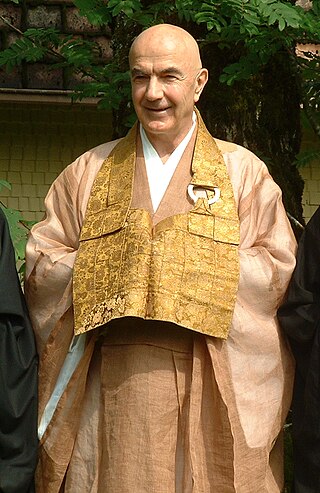
Richard Dudley Baker is an American Soto Zen master, the founder and guiding teacher of Dharma Sangha—which consists of Crestone Mountain Zen Center located in Crestone, Colorado and the Buddhistisches Studienzentrum (Johanneshof) in Germany's Black Forest. As the American Dharma heir to Shunryu Suzuki, Baker assumed abbotship of the San Francisco Zen Center (SFZC) shortly before Suzuki's death in 1971. He remained abbot there until 1984, the year he resigned his position after it was disclosed in the previous year that he and the wife of one of SFZC's benefactors had been having an ongoing affair. Despite the controversy connected with his resignation, Baker was instrumental in helping the San Francisco Zen Center to become one of the most successful Zen institutions in the United States.

The term American Buddhism can be used to describe all Buddhist groups within the United States, including Asian-American Buddhists born into the faith, who comprise the largest percentage of Buddhists in the country.

John Daido Loori was a Zen Buddhist rōshi who served as the abbot of Zen Mountain Monastery and was the founder of the Mountains and Rivers Order and CEO of Dharma Communications. Daido Loori received shiho from Taizan Maezumi in 1986 and also received a Dendo Kyoshi certificate formally from the Soto school of Japan in 1994. In 1997, he received dharma transmission in the Harada-Yasutani and Inzan lineages of Rinzai Zen as well. In 1996 he gave dharma transmission to his student Bonnie Myotai Treace, in 1997 to Geoffrey Shugen Arnold, and in 2009 to Konrad Ryushin Marchaj. In addition to his role as a Zen Buddhist priest, Loori was an exhibited photographer and author of more than twenty books and was an avid naturalist.

The White Wind Zen Community (WWZC) is based at the Zen Centre of Ottawa in Ottawa, Ontario, with branch centres in Wolfville, Nova Scotia and Harrow, England. The Community is led by the Venerable Anzan Hoshin roshi. It consists of both a monastic order, the Northern Mountain Order, and a large community of associate, general, and formal lay students.

Hakuyū Taizan Maezumi was a Japanese Sōtō Zen Buddhist priest who substantially contributed to development of Zen in the USA.

Zen Mountain Monastery is a Zen Buddhist monastery and training center on a 230-acre (0.93 km2) forested property in the Catskill Mountains in Mount Tremper, New York. It was founded in 1980 by John Daido Loori originally as the Zen Arts Center. It combines the Rinzai and Sōtō Zen traditions, in both of which Loori received Dharma transmission. Loori's first dharma heir was Bonnie Myotai Treace, Sensei, who received shiho, or dharma transmission, from him in 1996. From Loori's death in October 2009 until January 2015, Zen Mountain Monastery had two teachers: Geoffrey Shugen Arnold and Konrad Ryushin Marchaj, who received Dharma transmission from Loori in 1997 and 2009, respectively. Since January 2015, the training at the Monastery has been led by Shugen Roshi, assisted by Ron Hogen Green, Sensei; Jody Hojin Kimmel, Sensei; and Vanessa Zuisei Goddard, Sensei.
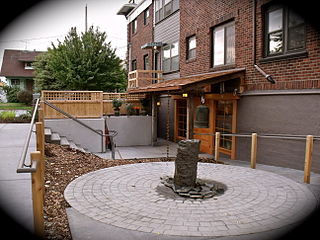
Dai Bai Zan Cho Bo Zen Ji is a Rinzai-style Zen temple located on North Beacon Hill in Seattle, Washington. Its name translates from Japanese as "Listening to the Dharma Zen Temple on Great Plum Mountain."
Gil Fronsdal is a Norwegian-born, American Buddhist teacher, writer and scholar based in Redwood City, California. He has been practicing Buddhism of the Sōtō Zen and Vipassanā sects since 1975, and is currently teaching the practice of Buddhism in the San Francisco Bay Area. Having been taught by the Vipassanā practitioner Jack Kornfield, Fronsdal is part of the Vipassanā teachers' collective at Spirit Rock Meditation Center. He was ordained as a Sōtō Zen priest at the San Francisco Zen Center in 1982, and was a Theravāda monk in Burma in 1985. In 1995, he received Dharma transmission from Mel Weitsman, the abbot of the Berkeley Zen Center.
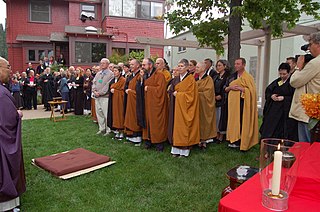
White Plum Asanga, sometimes termed White Plum Sangha, is a Zen school in the Hakuyu Taizan Maezumi lineage, created by Hakuyu Taizan Maezumi. It consists of Maezumi's Dharma heirs and subsequent successors and students. A diverse organization spread across the United States and with a small presence in Europe, the White Plum Asanga
[I]ncludes teachers who represent the spectrum of styles to be found to American Zen—socially engaged Buddhism, family practice, Zen and the arts, secularized Zen, and progressive traditionalism."
Below is a timeline of important events regarding Zen Buddhism in the United States. Dates with "?" are approximate.
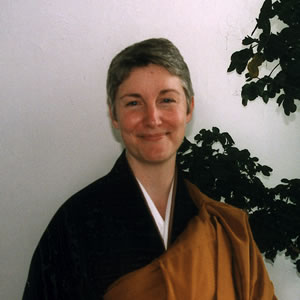
Bonnie Myotai Treace is a Zen teacher and priest, the founder of Hermitage Heart, and formerly the abbot of the Zen Center of New York City (ZCNYC). She teaches currently in Black Mountain and Asheville, North Carolina. Myotai Sensei is the first Dharma successor of John Daido Loori, Roshi, in the Mountains and Rivers Order (MRO), having received shiho, dharma transmission, from him in 1996. Serving and training for over two decades in the MRO, she was the establishing teacher and first abbess of the ZCNYC. At the Monastery she was the Vice Abbot, the first director of Dharma Communications, editor of Mountain Record, and coordinator of the affiliates of the MRO. Treace, ordained as a Zen monastic, now lives as a lay teacher, working primarily with her long-term students.
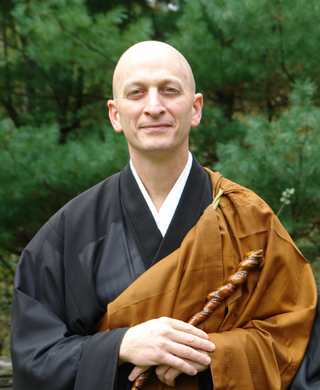
Geoffrey Shugen Arnold is Rōshi of the Mountains and Rivers Order (MRO) founded by John Daido Loori, from whom Shugen received shiho, or dharma transmission, in July 1997. As a lineage holder in the Sōtō tradition, Shugen currently serves as head of MRO and abbot of Zen Mountain Monastery in Mt. Tremper, New York, where he serves as the full-time resident teacher. Trained as a musician, Shugen was introduced to and began practicing Zen meditation in 1975. He began his formal training at Zen Mountain Monastery in 1984, and received tokudo, full monastic ordination, in 1988. Shugen's teachings have appeared in various Buddhist publications, including Buddhadharma: The Practitioner's Quarterly, The Mountain Record and in The Best Buddhist Writing 2005 and 2009. He is the author of O, Beautiful End, a collection of Zen memorial poems, published by Dharma Communications in 2012.
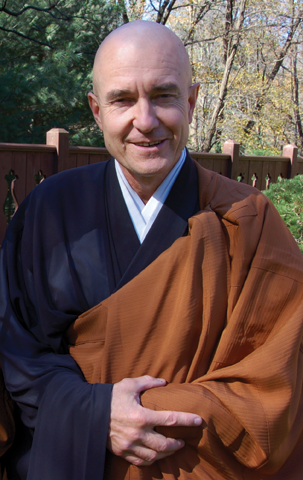
Konrad Ryushin Marchaj was from October 2009 to January 2015 abbot of Zen Mountain Monastery, the main house of the Mountains and Rivers Order (MRO) of Zen Buddhism, founded by John Daido Loori, Roshi, from whom Marchaj received shiho in June 2009. Ryushin entered into full-time residence at the Monastery in 1992 and became abbot there following Daido Roshi's death in 2009.
Thích Thanh Từ is a Vietnamese Zen Buddhist monk. He has been influential with increasing traditional Vietnamese Buddhism practices within the country.

Chan, from Sanskrit dhyāna, is a Chinese school of Mahāyāna Buddhism. It developed in China from the 6th century CE onwards, becoming especially popular during the Tang and Song dynasties.
Zen was introduced in the United States at the end of the 19th century by Japanese teachers who went to America to serve groups of Japanese immigrants and become acquainted with the American culture. After World War II, interest from non-Asian Americans grew rapidly. This resulted in the commencement of an indigenous American Zen tradition which also influences the larger western (Zen) world.

Seon or Sŏn Buddhism is the Korean name for Chan Buddhism, a branch of Mahāyāna Buddhism commonly known in English as Zen Buddhism. Seon is the Sino-Korean pronunciation of Chan an abbreviation of 禪那 (chánnà), which is a Chinese transliteration of the Sanskrit word of dhyāna ("meditation"). Seon Buddhism, represented chiefly by the Jogye and Taego orders, is the most common type of Buddhism found in Korea.